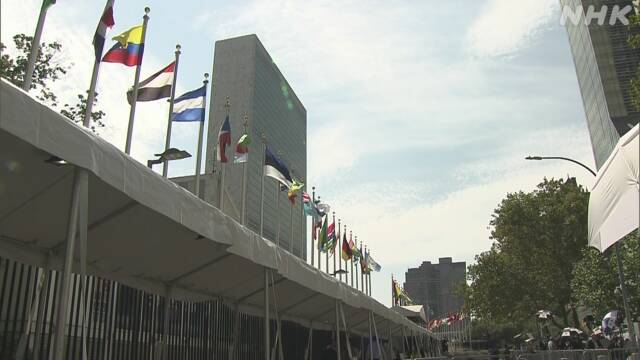At the United Nations Headquarters in New York, the address of the leaders of the United Nations General Assembly will soon begin.
It will be held in a normal face-to-face format for the first time in three years, and the main focus will be on the situation in Ukraine, where fierce fighting continues. get together.
At the United Nations Headquarters on the morning of the 20th, at 10:00 p.m. Japan time on the 20th, the leaders of each country will begin their general debates.
Until last year, the general meeting was held in the form of a video speech as a countermeasure against the new coronavirus, but this year it will be held in a normal face-to-face format for the first time in three years.
On the other hand, some leaders attended the state funeral of Queen Elizabeth in England on the 19th of the previous day, so the schedule of the originally scheduled speech has been changed significantly.
The main focus of this meeting is the situation in Ukraine, and as fierce fighting continues on the ground, attention will be focused on whether an opportunity can be found for a breakthrough in the situation, or, conversely, whether the composition of the confrontation will become clearer.
On the first day, the 20th, following the speech by Secretary-General Guterres at the beginning, Prime Minister Kishida, French President Macron and South Korean President Yoon Sung-nyeol are scheduled to make speeches.
Also, on the second day, the 21st, it was decided by a majority of the general assembly that President Biden of the United States will give a speech, and a pre-recorded video speech of President Zelensky of Ukraine will be played.
In addition, Russia's Foreign Minister Lavrov and China's Foreign Minister Wang Yi are scheduled to give speeches.
In parallel with the General Assembly, many individual summits and foreign ministers are scheduled to meet, and on the 22nd, a ministerial-level meeting of the Security Council will be held to discuss the situation in Ukraine. The Minister of Foreign Affairs is also expected to attend.
The order of speeches changed at Queen Elizabeth's state funeral
It has been customary for the heads of state to address the United Nations General Assembly, with Brazil first and the host country the United States second.
After that, speeches were given in order of the head of state such as the president of each country, the prime minister who is the top of the government, the minister of foreign affairs and other ministers, and the ambassador to the United Nations.
However, the day before the summit speech began, some of the leaders attended the state funeral of Queen Elizabeth in London, England, so the speeches will be given in a different order than usual. I was.
The host country, the United States, which has been the second to make a speech every year, was changed to the second day, the 21st, because President Biden attended the state funeral.
In addition, there are many other countries that request changes from the order that was once decided, and the originally planned schedule has changed significantly, making it an unusual situation where adjustments continue until just before.
President Zelensky's video speech is an exception
The summit speech at the United Nations General Assembly was a countermeasure against the new coronavirus, and last year it was all a video speech, and last year, member countries chose a face-to-face speech or a video speech, but this year, for the first time in three years, it was a normal speech. It will be conducted face-to-face.
Regarding this, the Ukrainian government has requested that the video speech be allowed as a special exception, saying that it will be difficult for President Zelensky to visit New York due to the ongoing military invasion by Russia.
As a result of the vote at the United Nations General Assembly on the 16th, 101 countries including Europe, the United States and Japan voted in favor, 7 countries including Russia, Belarus and North Korea opposed, and 19 countries including China and Brazil abstained. , President Zelensky's video speech was accepted by a majority.
However, Russia, which opposed the vote, and countries that abstained from the vote, objected that it was unequal because of the special treatment of Ukraine, and more than 60 countries did not participate in the vote. , the differences in the positions of each country over the situation in Ukraine have become clear again.

